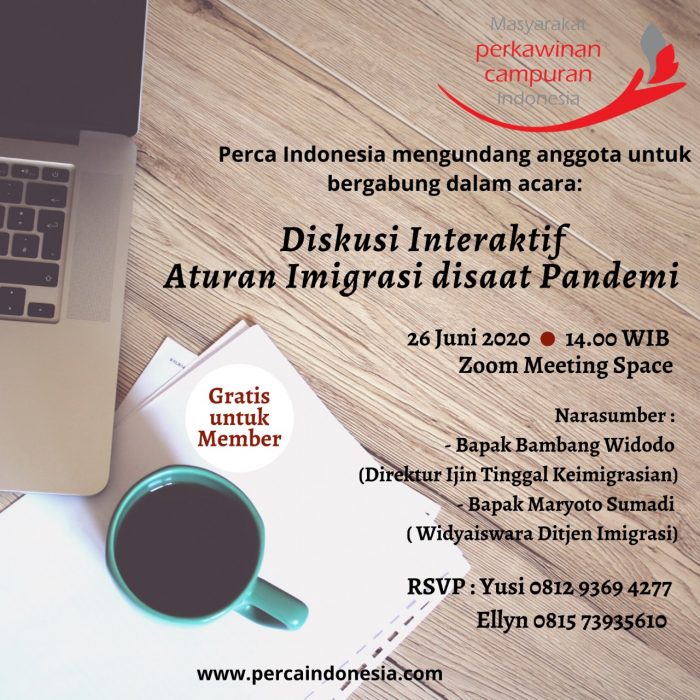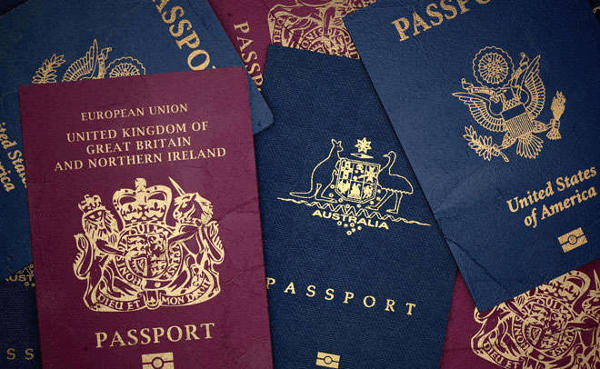Many rules have been modified by the Indonesian Directorate General of Immigration during the COVID-19 pandemic.
These modifications are rather confusing for foreign nationals and families of mixed marriages – Indonesian citizens who are married to foreigners.
Can I enter Indonesia although my KITAS or KITAP has expired? How can I extend my stay permit? I’ve only relied on Visa On Arrival all this time so I don’t have any KITAS, can I still enter Indonesia now?
I need to urgently return to my home country, so can I still return to Indonesia? These are just some of the questions which are circulating amongst Indonesian people who have foreign spouses living in Indonesia and abroad.
PerCa Indonesia strives for equality of civil and constitutional rights for mixed marriages in Indonesia, and the organisation always caters to the concerns and interests of its members. Therefore, a discussion for its members, who are mostly Indonesian women married to foreigners, was held on Friday 26th June regarding the constant immigration amendments. The main focus was around foreign nationals who cannot enter Indonesia although they already possess a Stay Permit Visa and/or a Work Permit and families of mixed nationals living abroad who are confused by the health protocols for entering Indonesia. However, members of this organisation had other concerns in mind.


Juliani recounted that there are foreigners who are aware of their stay permits expiring while they are abroad. There are even some couples abroad who are unable to enter Indonesia either because the current country they’re residing at is still on lockdown or they have incomplete documents. She finds it normal as a person who obeys the law and doesn’t want to have problems to return to Indonesia having concerns.
Burhanuddin, the Sub-Head of Residence Permits at the Indonesian Directorate General of Immigration, was the main speaker at the discussion. He answered a range of questions concerning the needs of Indonesian mixed marriage families. The women who participated reside all around Indonesia; in Jakarta, Yogyakarta, Medan, Bali, Batam, and so on, as well as those living abroad such as in Singapore and even Iraq.
The newest and most up-to-date circular letter from the Directorate General of Immigration regarding residence permits is still in production, according to Burhanuddin. “We don’t know when it will be issued but it’s under discussion with other parties, so please stay on alert and be patient,” he said. “In the meantime, your foreign spouse is authorised to enter Indonesia despite of their expired KITAS or KITAP,” he added.
However, he advised those who are currently in Indonesia and have an expiring stay permit to coordinate with immigration for an extension of their KITAS or KITAP prior to leaving the country. A new regulation might just emerge regarding when a foreigner decides to leave under an expiring or expired stay permit and therefore is not allowed to pass through immigration at the airport.
KITAS or KITAP renewals can be done online; it doesn’t have to be done at an immigration office – a way to avoid risks COVID-19 transmission. Previous photographs saved on the immigration’s data can be used on a KITAS renewal, although KITAP photographs still have to be taken on the spot. The issue with this, according to participants, is that the system was down for a moment. Ruri Roesman, the Head of Status Review Section, agreed to look further into the system’s disruption.
Surprisingly, some members revealed that not all of their foreign spouses have a KITAS, let alone a KITAP, because they have been relying on a Visa On Arrival. Couples who work and even children who study overseas usually visit Indonesia for a week to a month. Therefore, the need to get a KITAS or KITAP was neglected. An emergency stay that is free of charge and no penalty for an expired stay permit has been issued during the pandemic, but Juliani said, “this is a wake-up call for us” as a Visa On Arrival is currently not permissable due to the pandemic.
“I highly advise your foreign spouse to take care of their KITAS or KITAP soon. Issue one that does not require them to pay a work tax since it’s guaranteed by an Indonesian citizen (spouse). This way, they can avoid the hassle of entering Indonesia during the pandemic,” said Burhanuddin. “If they eventually need to do a visa run, find the nearest country that still opens its border,” he added.
Juliani believes people are sometimes looking for practical solutions because they’ve endured obstacles. For example, someone has a mobile lifestyle where they often travel and have limited time to take care of their permit. Hence, they only use Visa On Arrival. “We cannot blame them because travelling on the job is their professional requirement and their source of income,” she added.
One of the members at the discussion appealed to Burhanuddin for a special stay permit for couples who work and live abroad but wishes to visit their families residing in Indonesia. Burhanuddin replied, “the end of the COVID-19 pandemic is unclear and incidentally, there is no regulation about this yet. In the meantime, when permissable, opt for a Social or Cultural Visit Visa instead.”
PerCa Indonesia highly appreciates the government’s policy efforts but the organisation would like the government to acknowledge the stakeholders related to these restrictions, while also not discriminating against or being suspicious of people who appeal decisions. Moreover, PerCa Indonesia is keen to hold a similar discussion once the new Directorate General of Immigration circular letter is published so that their members can obtain better clarity, especially for those who need it.




